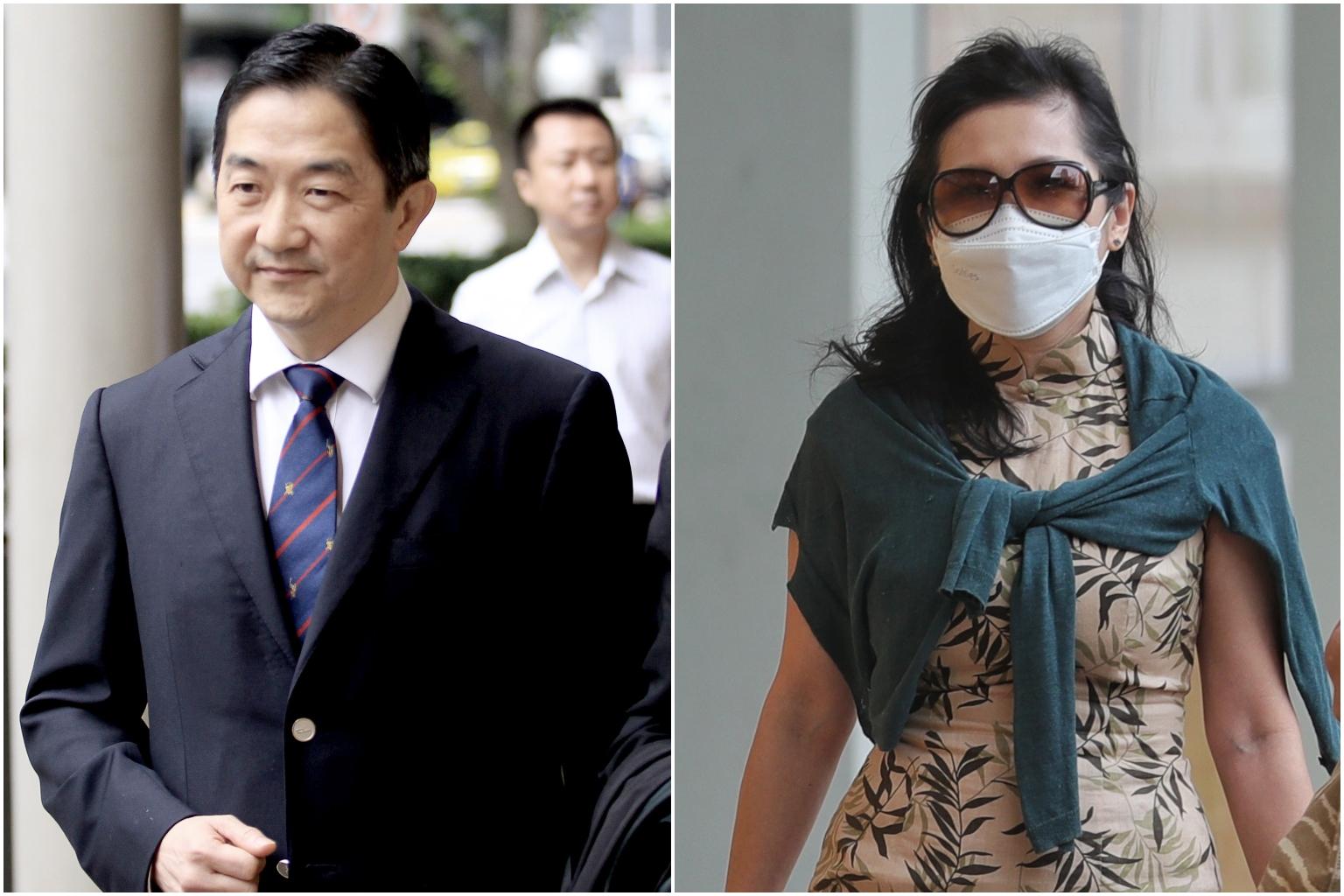John Soh, Quah Su-Ling found guilty of 349 charges in Singapore's $8b penny stock crash
Sign up now: Get ST's newsletters delivered to your inbox

The stock market manipulation was masterminded by John Soh Chee Wen and his girlfriend Quah Su-Ling.
PHOTOS: LIANHE ZAOBAO, KEVIN LIM
Follow topic:
SINGAPORE - Malaysian John Soh Chee Wen and his girlfriend Quah Su-Ling, the masterminds of Singapore’s most serious case of market manipulation that wiped out more than $8 billion from the stock market in October 2013, were convicted on 349 counts of market manipulation, deception and cheating financial institutions.
High Court judge Hoo Sheau Peng on Thursday afternoon (May 5) found Soh guilty of 180 charges of the 188 he was facing, while Quah was convicted on 169 of 177 she faced.
Both were acquitted of eight deception charges. Their sentencing will take place at a later date.
According to the police, they face imprisonment of up to seven years, a fine of up to $250,000, or both for each charge under the Securities and Futures Act; imprisonment of up to 10 years and a fine, for each charge under section 420 of the Penal Code; and jail of up to seven years, a fine or both for each charge under section 204A of the Penal Code.
They also face imprisonment of up to two years, a fine of up to $10,000, or both for each charge under section 148 of the Companies Act.
The pair were convicted over manipulating the share prices of Blumont Group, Asiasons Capital and LionGold Corp - known collectively as BAL - between August 2012 and October 2013, through a web of 187 trading accounts held with 20 financial institutions in the names of 58 individuals and companies.
“Participation in criminal conspiracy itself is an offence,” Justice Hoo Sheau Peng said in her verdict delivered on Thursday.
Having considered the trading practices, evidence and conduct of the accused, “I am satisfied beyond reasonable doubt that there existed a conspiracy between the two accused persons to manipulate the market" for the BAL shares, she said.
The duo manipulated the market and price of BAL shares by controlling and using the 187 trading accounts to make thousands of manipulative trades in each of the three stocks, the police said in a statement Thursday.
“In particular, the trades between the controlled accounts were conducted to generate artificial liquidity and demand for these shares, to cause the (BAL) share prices to rise over time, and to retain control of large amounts of shares without disclosing this to the market. The 58 account holders had handed over control of their accounts to Soh and Quah,” the police said.
The judge noted that Soh and Quah remained "extensively involved with matters pertaining to the accounts even after the crash on October 4, 2013".
This included negotiations of settlements with the financial institutions and settlement of losses.
The judge also found “the volumes of wash trading clearly support the conclusion that the accused persons’ use of the 187 controlled accounts was illegitimate”.
Wash trading refers to using one controlled account to sell to, or buy from another controlled account, manufacturing false trading volumes in the process.
Another way the scheme was funded was by deceiving Goldman Sachs International and Interactive Brokers into extending margin financing and delivering payment of more than $230 million for the purchase of securities, by offering BAL shares as collateral, while concealing from the financial institutions that the market for BAL shares was manipulated.
“It cannot seriously be doubted that it is relevant and material for a bank to know that a share being pledged as collateral for financing is the subject of manipulative practices. To suggest otherwise would be to encourage concealment.
“Given the lack of disclosure of such information by (Quah), I find that a deception was practised on Goldman Sachs,” the judge said.
The judge also dismissed as “entirely unmeritorious” allegations put up by the defence that “the case constructed by the prosecution was blinkered by their ill-formed and uncompromising belief in the accused persons’ guilt, as well as their desire to pin the blame on them.
“It is important for me to state that allegations of such nature, especially of impropriety by counsel, should never be lightly made. They distract from the substantive issues to be determined, and they have the potential to cast doubt on the fair administration of justice,” Judge Hoo said.
Soh, 62, who looked visibly thinner, was also charged under the Companies Act (CA). He has been in remand since November 2016, while Quah, the former chief executive of Ipco (now renamed Renaissance United), is out on bail of $4 million.
More than 40 people including Quah’s family and friends attended Thursday’s court hearing after the verdict was delivered, which came after 194 days of trial over the past three years, with close to 100 prosecution witnesses giving testimony.

